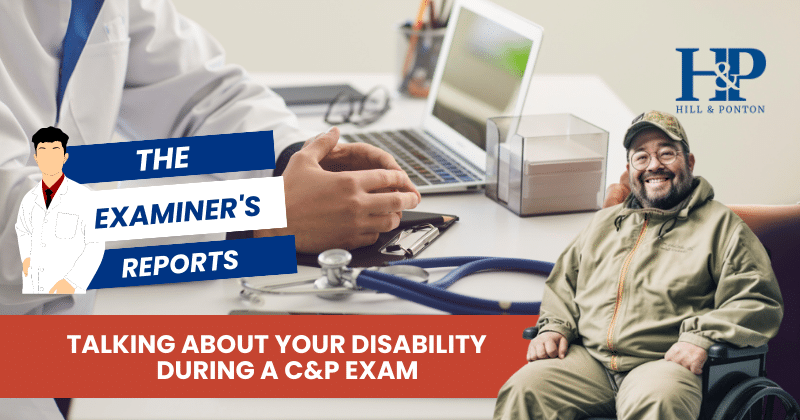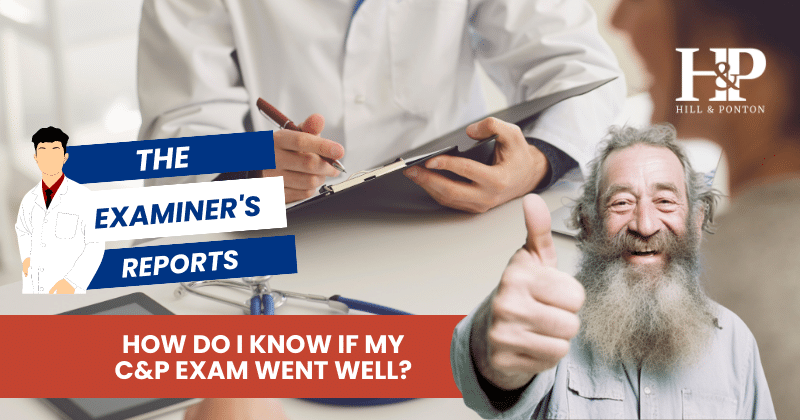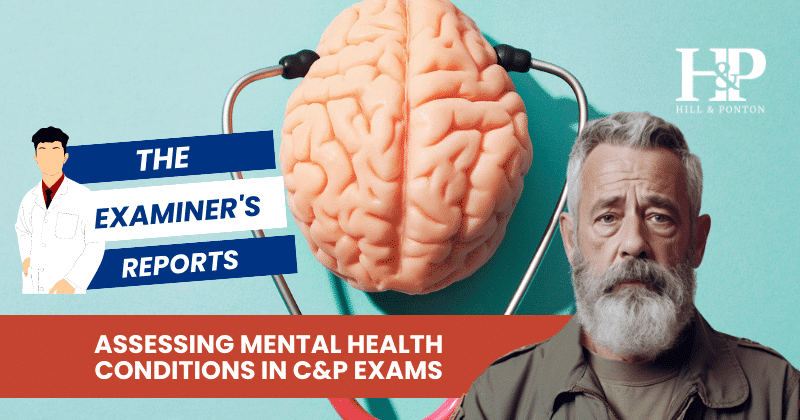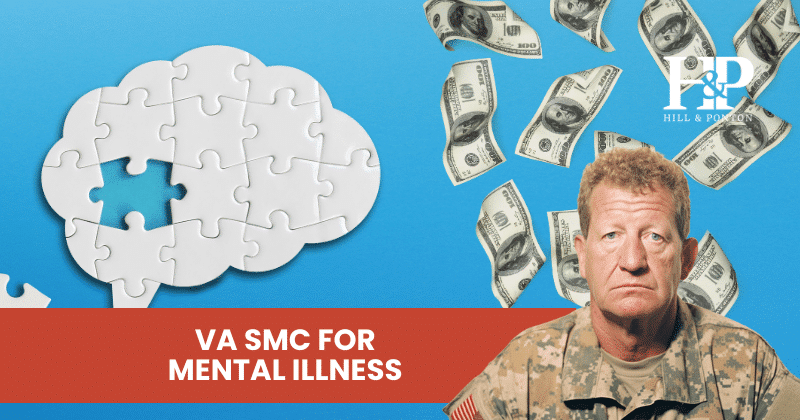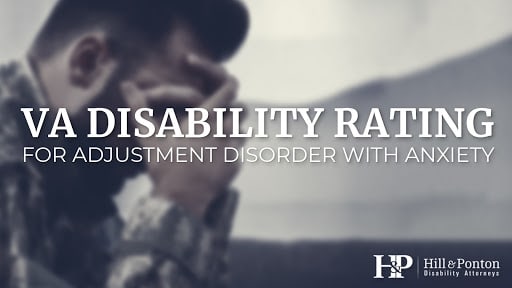
A VA medical examiner explains mental health C&P exams and how to prepare for them.
Some disabilities are obvious. If you’ve suffered a burn wound or shrapnel injury, the evidence is typically clear – just show someone your skin! But what about assessing disability claims for mental health conditions, like Post-Traumatic Stress Disorder (PTSD), depression, and anxiety?
Unlike physical disabilities, mental health conditions can be invisible to the untrained eye, making them difficult to initially explore and uncover. For disability examiners like me, mental health conditions like these present additional complexities because they often encourage the veteran to keep quiet about the full extent of their illness.
This is a real problem, because one of the most critical elements to establishing service connection for a medical disability (and then being appropriately rated for it) is being able to fully describe your history and symptoms to your C&P examiner.
Let’s talk about how you can prepare to successfully navigate the process and appropriately answer the questions that will be addressed to you during the C&P exam.
First, it may help to discuss in broad strokes some of the most common mental health illnesses seen in veterans. You can find out more about obtaining VA ratings for them by following the links to each disability’s guide or dedicated article.
1. Post-Traumatic Stress Disorder (PTSD)
PTSD is a mental health condition that can develop after experiencing or witnessing a traumatic event. Veterans are often exposed to combat situations, witness gruesome or difficult injuries/deaths, and endure high-stress environments during their military service. Symptoms of PTSD include flashbacks, nightmares, hypervigilance, trigger-avoidance, and variable emotional distress, which may be difficult to discuss during a medical exam. Read our special guide dedicated to the C&P exam for PTSD.
2. Depression
Depression is a mood disorder characterized by persistent feelings of sadness, hopelessness, and a loss of interest in activities. Veterans may experience depression due to a variety of factors, including the emotional toll of combat, separation from loved ones during deployments, readjustment challenges upon returning to civilian life, and dealing with physical injuries or chronic pain. See these tips about the C&P exam for anxiety and depression.
3. Anxiety Disorders
Anxiety disorders, such as generalized anxiety disorder (GAD) and panic disorder, are prevalent among veterans. The constant exposure to high-stress situations, including combat, can lead to persistent feelings of worry, fear, and anxiety, which often persist after active duty has ended. Learn how to prepare for the C&P exam for anxiety and depression.
4. Substance Use Disorders
Veterans are at an increased risk of developing substance use disorders, including alcohol or drug abuse. As providers, we often see a compounding of mental health conditions, wherein veterans respond to the emotionally-distressing components of PTSD, depression, etc. with substance use as a coping mechanism. Read more below about how to prepare for the C&P exam.
5. Traumatic Brain Injury (TBI):
Traumatic Brain Injury may not be something you immediately think of when considering mental health, but it is closely linked. TBI refers to the disruption of normal brain function due to a blow, jolt, or penetrating head injury. Veterans can sustain TBIs from combat-related injuries, exposure to explosions or blasts, or accidents during military service, and these can result in long-term cognitive difficulties, memory problems, unpredictable mood changes, and increased risk of developing mental health conditions such as depression, anxiety, and PTSD.
How to Prepare for Your Mental Health C&P Exam
In some ways, you might think calling these mental health conditions “invisible” is a misnomer – loved ones close to a veteran struggling with one of these conditions usually know that something is wrong, even if they may not have the right language to describe it.
When I say “invisible,” I am referring to the phenomenon that occurs when a veteran presents to a clinical encounter with a provider like myself, puts their best foot forward, and does their best to hide the emotionally distressing symptoms they live with every day.
One of the biggest reasons a veteran may do this is due to the sensitive nature that can make these matters difficult to discuss. Most people already find it difficult in a general sense to discuss emotions and thought processes, but if you’ve been diagnosed with a mental health issue, you know how much more difficult it can become.
One of the best ways to navigate around this is with strong preparation. The following tips are specifically for helping you to prepare your headspace and emotions for addressing mental health conditions with an examiner:
Acknowledge Your Feelings
It’s normal to feel anxious, uncomfortable, or vulnerable when discussing your mental health, and it’s important for you to recognize that. It is essential to validate your emotions and remind yourself that seeking help and advocating for your well-being is a courageous step.
Educate Yourself
Learn about the C&P exam process and what to expect during the assessment. At Hill and Ponton, we have extensive online resources available for almost every disability in existence, including extensive content around mental health disabilities.
As an examiner myself, I try to help people understand exactly the information we are looking for during a C&P exam – I’ve previously consolidated a high-value list of the best practices on discussing your disability with an examiner.
Through a mental health lens, understanding the purpose of the C&P exam, the types of questions that may be asked, and the documentation required can help alleviate some anxiety. Typically, the more informed you are, the more prepared you will feel.
Seek Support from Loved Ones
Reach out to trusted individuals who can provide emotional support. This could be a family member, friend, or mental health professional. Sharing your concerns and anxieties with someone who understands your circumstances can help relieve some of the stress associated with discussing your conditions.
All examiners are required to complete a Disability Benefits Questionnaire, which contains all the relevant questions they should be asking you during the exam. Knowing this, you can ask a loved one to do a trial run with you before the day of your examination so you can get comfortable answering the questions in advance.
Seek Support from Your Provider
If you’re not working with a psychiatrist, psychologist, counselor, or therapist, you may want to consider doing so – working with mental health professionals who specialize in veteran care can make sure your symptoms are accurately documented over the term of your treatment.
They can also assist in providing supporting statements or nexus letters linking the mental health condition to military service, strengthening the disability claim.
Practice Self-Care
Prioritize self-care in the days leading up to the exam. Engage in activities that help you relax and reduce stress. This could include exercise, meditation, deep breathing exercises, listening to calming music, or engaging in hobbies that bring you joy.
Prepare and Organize
Take the time to gather and organize relevant documents, medical records, and any additional supporting information. Having these materials readily available will not only help you feel more prepared but also ensure that you have all the necessary information to accurately describe your symptoms and experiences.
If you’re curious to see a full “bring-with-you” list, I’ve previously written a list of the best things you can bring to a C&P exam to be successful.
Write Down Your Thoughts
Consider jotting down your thoughts, concerns, and specific examples of how your mental health condition affects your daily life, using the Mental Health DBQ or PTSD DBQ as a guide. This can serve as a reference during the exam and help you articulate your experiences more effectively.
Be Detailed
During the C&P exam, you should make an effort to descriptively discuss your symptoms. Appreciating this may be difficult, it is crucial to provide specific examples of how your condition impacts daily life, relationships, work, and overall functioning, especially if it has an impact on your income-earning potential.
Using descriptive language will help disability examiners better understand the severity and impact of the mental health condition.
Practice Self-Compassion
Be kind to yourself throughout the process. Remember that your experiences are valid, and it is essential to advocate for your needs.
Treat yourself with compassion, and remind yourself that seeking support and disability compensation is a step towards getting the help you need to improve your well-being.
Consider Accompaniment
If you feel overwhelmed or would benefit from additional support, consider having a trusted individual accompany you to the exam. They can provide emotional support and help ensure that your concerns and experiences are accurately conveyed.
If you’ve practiced your mental health C&P exam questions with them, they may be even more in tune with the information you may end up missing.
Assessing PTSD, anxiety or depression in C&P exams presents unique challenges for disability examiners due to the invisible nature of these disabilities and the complex manifestations they can have. But that doesn’t mean you can’t still be successful in establishing a service-connected condition for a mental health disability.
Hopefully these best practices will support your ability to effectively communicate, enhance your chances of success, and stay mentally strong through the process.
